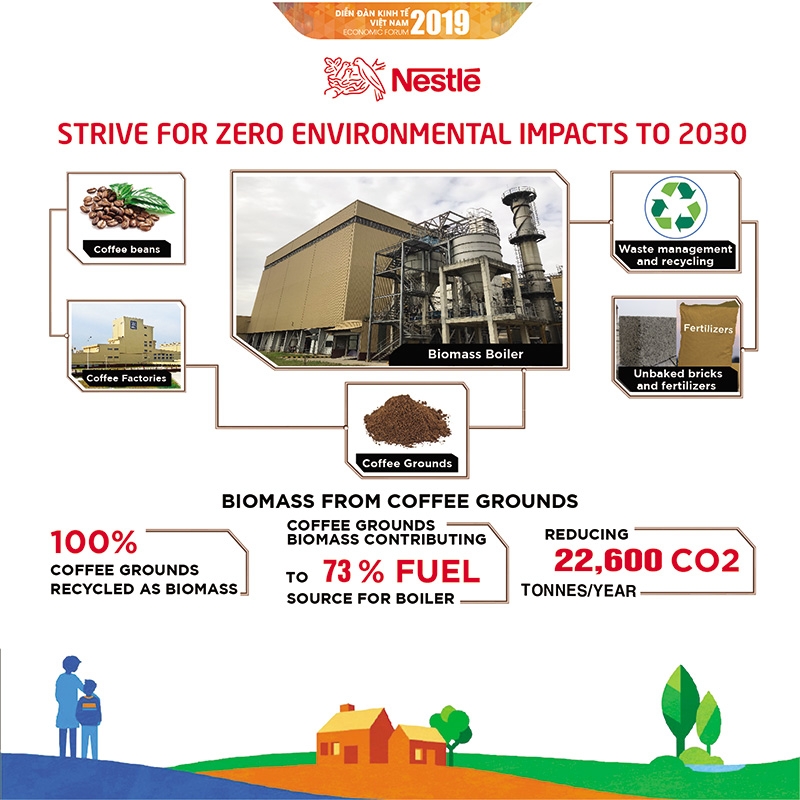Nestlé awes with sustainability goals
 |
| One of the examples among Nestle’s circular economy initiatives |
“In 2018, the group set out an ambitious goal of recycling and reusing 100 per cent of our product packaging towards 2025. We’ve so far carried out various initiatives to realise this goal,” wrote Nestlé.
As Vietnam makes great strides towards fostering a circular economy, multinational corporations have restated their support and commitment to the cause. The circular economy is defined as an economic system that minimises waste through the “reduce, reuse, recycle” process, aiming to lessen the negative impacts of industrialisation and business activities on both the society and the environment.
In Vietnam, one of the strongest proponents of the circular economy concept is Nestlé, the world’s leading nutritional company. On the global level, Nestlé applies a life cycle approach to environmental sustainability and adopts a Water and Environmental Sustainability Policy. Thanks to these global initiatives, Nestlé, with its well-known brands like Nescafe, Maggi, and Milo, is consistently ranked among the top ten most sustainable businesses in Vietnam.
Throughout its 25 years of operation in the country, sustainability has been a great focus of Nestlé, and its commitment to the circular economy is a natural next step in this journey.
According to Nestlé Vietnam, the group strives to become an international corporation that not only integrates into the local community, but also accompanies that community on its path towards long-term growth and prosperity.
“Sustainability efforts, and subsequently the endorsement of the circular economy, are crucial aspects of this vision,” said Nestlé.
Strive for zero impact
In Vietnam, one of Nestlé’s key sustainability projects is called “zero waste to landfill”. The company considers this an important step in its “path to zero” mission and its embrace of the circular economy. This environmentally-conscious mindset has led Nestlé Vietnam to find new and innovative ways to recycle waste.
Just one example of Nestlé’s continuous quest to find new and innovative ways is the initiative to take 100 per cent of production waste generated by Nestlé’s facilities to reuse, recycle, and incinerate for heat recovery. All six Nestlé factories in Vietnam follow the world’s highest standards in environmental protection, and the company made a strong pledge to follow the country’s anti-pollution measures. In 2018, all factories met the “path to zero” requirements.
Eco-partnerships to deliver sustainability goals
Besides its recycling efforts, Nestlé Vietnam is also a strong leader in sustainability programmes. The latest project was carried out at Vinhomes Central Park in Ho Chi Minh City, where Nestlé Vietnam teamed up with social enterprise mGreen to help residents classify and recycle their own household waste.
Also as part of this programme, students at VinSchool Central Park were taught how to separate waste via lessons, Nestlé factory visits, and the “young ambassadors” project where they promote sustainability practices to their family and neighbours.
Nestlé Vietnam and mGreen hope that this programme could set an example that helps raise awareness about sustainability to a wider area of residency across the country.
Not stopping there, Nestlé Vietnam also joined the Packaging Collection and Recovery Initiative (PCRI), led by nine local leading food and beverage companies and circular economy experts. PCRI provides a set of activities to push collecting and recovering packaging waste, engaging local recyclers, formal and informal collectors, and junk shops towards having zero packaging leakage into the environment.
Looking ahead, Nestlé Vietnam said it will continue to base sustainability practices on the Sustainable Development Goals (SDGs) set out by the United Nations with a vision towards 2030. The SDGs cover a wide range of issues, from environmental protection and climate change to social equality, poverty reduction, and food waste treatment.
These efforts, according to Nestlé, showcase the company’s commitment to the long-term, sustainable growth of Vietnam, staying true to its “Creating Shared Values” slogan.
What the stars mean:
★ Poor ★ ★ Promising ★★★ Good ★★★★ Very good ★★★★★ Exceptional
 Tag:
Tag:
Related Contents
Latest News
More News
- $100 million initiative launched to protect forests and boost rural incomes (January 30, 2026 | 15:18)
- Trung Nam-Sideros River consortium wins bid for LNG venture (January 30, 2026 | 11:16)
- Vietnam moves towards market-based fuel management with E10 rollout (January 30, 2026 | 11:10)
- Envision Energy, REE Group partner on 128MW wind projects (January 30, 2026 | 10:58)
- Vingroup consults on carbon credits for electric vehicle charging network (January 28, 2026 | 11:04)
- Bac Ai Pumped Storage Hydropower Plant to enter peak construction phase (January 27, 2026 | 08:00)
- ASEAN could scale up sustainable aviation fuel by 2050 (January 24, 2026 | 10:19)
- 64,000 hectares of sea allocated for offshore wind surveys (January 22, 2026 | 20:23)
- EVN secures financing for Quang Trach II LNG power plant (January 17, 2026 | 15:55)
- PC1 teams up with DENZAI on regional wind projects (January 16, 2026 | 21:18)





















 Mobile Version
Mobile Version